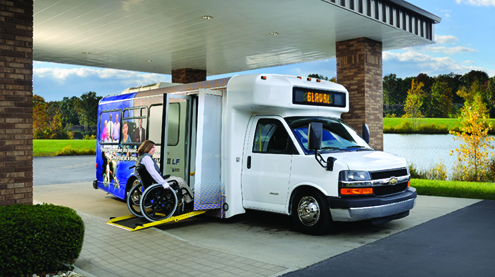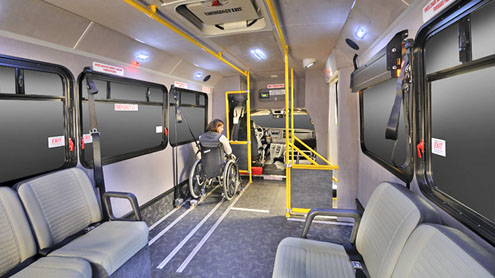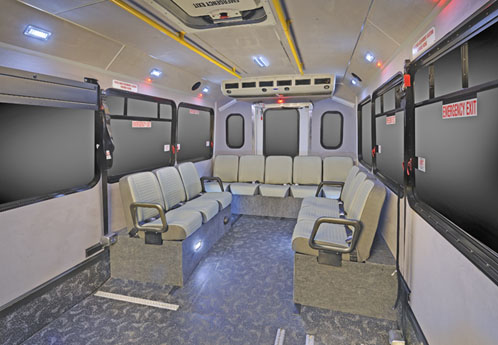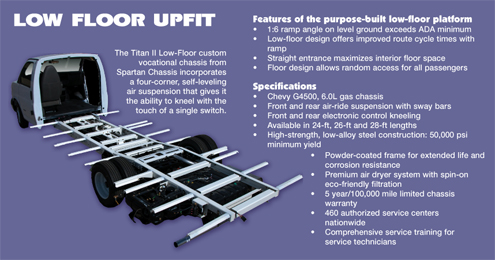

Texoma Area Paratransit System (TAPS), Sherman, TX, sold on the kneeling feature and easy access
By David Hubbard
The Americans with Disabilities Act (ADA) of 1990 mandates that people with disabilities and other physical or mental challenges be able to lead productive lives through the availability of public transit. The legislation is the impetus of low-floor bus design, which utilizes a ramp for wheelchair passengers to board. Until then, people with disabilities considered public transportation out of the question. With the rise in mobility-assisted ridership for the disabled and elderly, now more than ever the demand for low-floor buses is in full stride.
Glaval Bus, Elkhart, IN, a manufacturer of commercial buses since 1998, first unveiled the prototype of its Titan II LF low floor model in 2011. Based on its predecessor, the Titan II, one of the company’s top-selling models, the Titan II LF totally eliminates the need for steps by incorporating a Ricon or Braun wheelchair ramp with a 1:6 slope, which exceeds the current ADA minimum standard of 1:4. The Titan II LF is available in 24-, 26- and 28-foot lengths with various random access configurations to accommodate up to five wheelchairs.
Glaval Bus worked with Spartan Chassis™, Charlotte, MI, to develop an integrated chassis/floor structure to achieve a level floor surface for all wheelchair positions with only a minor slope between the rear wheel wells.
Utilizing a Chevy 4500 as its foundation, Spartan made extensive design modifications and reinforcements to the chassis and incorporated a four-corner self-leveling air-ride suspension with capability to kneel with the touch of a single switch.
The Spartan purpose-built structure integrates the chassis frame rails into the lowered floor members while maintaining much of the Chevy OEM components like the drive shaft, rear axle and brakes.

Models are available with a rear wheel drive Vortec 6.0L V-8. Glaval says it is also looking to offer the Titan II LF with the Duramax 6.6L diesel in the near future. Compressed Natural Gas (CNG) is also an option.
Texoma Area Paratransit System (TAPS), Sherman, TX, is a private, non-profit corporation providing assisted bus transportation. From its facilities in Sherman and Dennison TAPS serves elderly and disabled passengers in six counties, running 67 active units on six routes and covering two million miles a year.
TAPS General Manager Joel Gardner of managing partner First Transit was among the first to demo the prototype, using it in service this past spring and summer.
“We were actually considering and testing as many as five different vehicles,” he says. “When the Glaval Titan II LF came in, it looked very sleek and it rolled well. But more importantly to me, when I look at a vehicle it’s always from an operational maintenance standpoint. The best feature on this bus in my opinion is the kneeling function — a huge selling point for me. As the entire vehicle would lower, the front axle would pigeon-toe and cant, which appeared to be less stressful on the substructure.”
Gardner says he is always looking for what he might have to worry about, in this case, what effect the kneeling function might have on the original body and framework, and what repairs may crop up.
“Glaval, Chevy and Spartan really came together on this model,” Gardner says. “This model is integrated so that it does not appear that the kneeling function is adding any additional stress and strain; especially on the front end of this vehicle.
The bus flows smoothly into the kneeling position in a beautiful little orchestration. They were very careful and patient with the engineering to get it correct.”
Preferring function over form, Gardner says the Titan II LF performs just as operators and maintenance personnel would like.
“In our mind, a vehicle must first be mechanically sound and relatively easy to maintain,” he says. “I am not concerned about its looks. A bus could be laced with gold, but if there are operational and maintenance issues, I could care less.”
As for any features or issues with the Titan II LF Gardner might share with the manufacturer, he says it is still too early to tell, as TAPS will not begin taking delivery on its procurement of at least 12 Titan II LFs until spring 2013.
“Once the buses begin arriving and we have them in service, we may see something we want to discuss with Glaval; something where we would like to see a modification,” he says. “I think OEMs are listening to operators. I am confident any concerns would be taken to heart and that the OEM would respond proactively to come up with solutions.”
Overall, the TAPS team appreciates the low floor on type-2 and type-3 cutaways because of the ease of working with elderly and disabled passengers.
“It just makes it so much easier and faster than using standard WC lifts,” says Gardner. The use of a ramp saves an hour or more a day loading passengers who require an ADA accommodation.” BR


